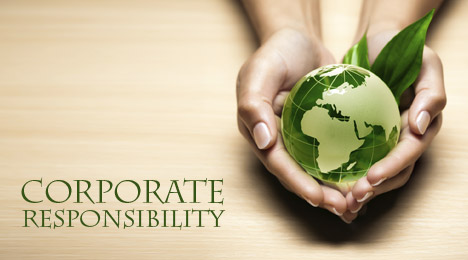.
Jackie: For this week's podcastsinenglish.com business podcast I'm speaking to John. Hi, John.
John: Hi, Jackie.
Jackie: John works for BP that's correct, isn't it?
John: It is.
Jackie: And we're going to be talking about corporate responsibility. John, in your opinion, what does corporate responsibility mean?
John: I think corporate responsibility has to be a reflection of a holistic, an all round er… impact that a company has on society, and it becomes more important now than perhaps er… ever in the history of companies.
Jackie: Ok, so um… first of all, why do you think it is more important now?
John: Companies have an important er… obligation and commitment to society. So if we think about corporate responsibility, some people might describe it as when a company gives money to good causes and while those donations, those social investments, are undoubtedly important, I'd argue that we should also look at the topic more holistically.
Jackie: Ok, so that's my second question. Can you give an example of… of that, then?
John: Sure, Jackie. I think maybe the easiest way of looking at it, is that when people look at companies, we have to look at how they employ people. Do they employ people fairly? Do they employ people in a meritocracy? Do they employ people thinking about issues of diversity, of where the company operates, how a company pays taxes, how a company does its contracting, how a company does its procurement? And if you carry on looking at all those issues, then that operational set of issues about a company is how one should judge our corporate responsibility.
Jackie: Therefore the whole approach of the company should be um… a responsible approach to everything, not just every so often giving loads of money to a charity for doing good work in Africa, for example.John: Not a bad way of putting it. In many ways we have to look at the whole operational standards and the way in which a company works. So my, not very good, example is if a man beats his wife on a Saturday evening and goes to church on a Sunday morning and gives money, that doesn't make him a good man. So donations from companies are important. They can provide extra funding for critical issues which the public sector doesn't fund. But the broader issue about the quality of the goods and services, the environmental standards, the safe working practices, the way in which a company pays taxes, the way in which we employ people, develop people, train people, retain people, all those issues added up to together, er… is an indicator of our responsibility. As a final thought, Jackie, when your listeners er… look at the er… the way in which companies work in society, we need to help, all of us, look at it over a longer period of time and in the long term the interests of people tend to overlap. In the short term there can sometimes be differences. And so I think what we should all try to strive is both make judgments accurately and try to make them over the longer term. That way, we help the public and the private sectors become er… part of the solution together, not part of a problem.Jackie: Well thank you, John, for that. I think when I first asked you the question, I wouldn't know how to answer that question myself, what corp… what corporate responsibility is but I think I have a better idea now. Thank you very much.John: Thank you, Jackie.
